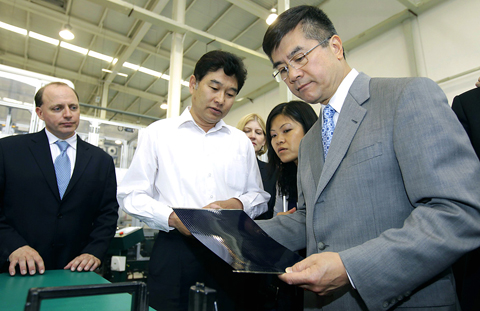The US could fall behind China and other countries in clean energy technology unless Congress passes energy legislation, US Commerce Secretary Gary Locke (駱家輝) said yesterday.
Many US investors were reluctant to plow money into big solar, wind and other clean energy sectors until they knew what technologies US government policy was going to favor, he said.
“There’s too much capital sitting on the sidelines for lack of an energy policy,” Locke said during a stop at US and Chinese joint venture project to build batteries for electric vehicles.

PHOTO: REUTERS
“The longer we wait, the more that others, whether it’s China, Germany and other countries, will be moving ahead,” he said.
While legislation to fight global warming and provide stronger economic incentives for renewables energy still faces an uncertain fate in Congress, China is pushing clean energy projects on a number of fronts.
“The opportunities are stunning in China because China has enormous economic growth and that economic growth has led to enormous demands for energy,” said Locke, who headed a group of 24 US clean energy companies on a trade mission to Hong Kong, Shanghai and Beijing this week.
The joint venture between US company Coda and its Chinese partner, Tianjin Lishen Battery (天津力神電池), was a model of how cooperation in the clean energy sector could create jobs in both countries, Locke said.
Lishen builds the batteries for an electric vehicle that Coda plans to sell in the US. The Chinese state-owned oil firm, CNOOC (中海油), is also an investor in the project.
Locke also visited the Tianjin facility of a joint venture between United Solar Ovonic, a subsidiary of Energy Conversion Devices, and Tianjin Jinneng Investment Co (天津津能投資) to convert US-made solar cells into solar modules for the Chinese market.
“We do about 75 percent of the manufacturing in Michigan and then we roll it up and we ship it to Tianjin, where they finish it, cut it up into the sizes that they need,” Uni-Solar vice president Martha Duggan said.
Uni-Solar signed an agreement during Locke’s trip to sell 500 kilowatts of its thin-film solar laminates to NYKE Solar Integrators, a Chinese company, for a demonstration project.
“Our theory is that by doing this particular business model, we’re creating and sustaining jobs in Michigan and in China,” Duggan said.

IN THE AIR: While most companies said they were committed to North American operations, some added that production and costs would depend on the outcome of a US trade probe Leading local contract electronics makers Wistron Corp (緯創), Quanta Computer Inc (廣達), Inventec Corp (英業達) and Compal Electronics Inc (仁寶) are to maintain their North American expansion plans, despite Washington’s 20 percent tariff on Taiwanese goods. Wistron said it has long maintained a presence in the US, while distributing production across Taiwan, North America, Southeast Asia and Europe. The company is in talks with customers to align capacity with their site preferences, a company official told the Taipei Times by telephone on Friday. The company is still in talks with clients over who would bear the tariff costs, with the outcome pending further

A proposed 100 percent tariff on chip imports announced by US President Donald Trump could shift more of Taiwan’s semiconductor production overseas, a Taiwan Institute of Economic Research (TIER) researcher said yesterday. Trump’s tariff policy will accelerate the global semiconductor industry’s pace to establish roots in the US, leading to higher supply chain costs and ultimately raising prices of consumer electronics and creating uncertainty for future market demand, Arisa Liu (劉佩真) at the institute’s Taiwan Industry Economics Database said in a telephone interview. Trump’s move signals his intention to "restore the glory of the US semiconductor industry," Liu noted, saying that

STILL UNCLEAR: Several aspects of the policy still need to be clarified, such as whether the exemptions would expand to related products, PwC Taiwan warned The TAIEX surged yesterday, led by gains in Taiwan Semiconductor Manufacturing Co (TSMC, 台積電), after US President Donald Trump announced a sweeping 100 percent tariff on imported semiconductors — while exempting companies operating or building plants in the US, which includes TSMC. The benchmark index jumped 556.41 points, or 2.37 percent, to close at 24,003.77, breaching the 24,000-point level and hitting its highest close this year, Taiwan Stock Exchange (TWSE) data showed. TSMC rose NT$55, or 4.89 percent, to close at a record NT$1,180, as the company is already investing heavily in a multibillion-dollar plant in Arizona that led investors to assume

AI: Softbank’s stake increases in Nvidia and TSMC reflect Masayoshi Son’s effort to gain a foothold in key nodes of the AI value chain, from chip design to data infrastructure Softbank Group Corp is building up stakes in Nvidia Corp and Taiwan Semiconductor Manufacturing Co (TSMC, 台積電), the latest reflection of founder Masayoshi Son’s focus on the tools and hardware underpinning artificial intelligence (AI). The Japanese technology investor raised its stake in Nvidia to about US$3 billion by the end of March, up from US$1 billion in the prior quarter, regulatory filings showed. It bought about US$330 million worth of TSMC shares and US$170 million in Oracle Corp, they showed. Softbank’s signature Vision Fund has also monetized almost US$2 billion of public and private assets in the first half of this year,